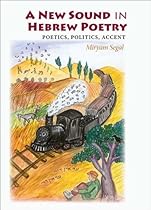A New Sound in Hebrew Poetry: Poetics, Politics, Accent (Jewish Literature & Culture)

| Author | : | |
| Rating | : | 4.93 (917 Votes) |
| Asin | : | 0253352436 |
| Format Type | : | paperback |
| Number of Pages | : | 232 Pages |
| Publish Date | : | 2016-04-04 |
| Language | : | English |
DESCRIPTION:
Miryam Segal is Assistant Professor in the Department of Classical, Middle Eastern, and Asian Languages and Cultures at Queens College, The City University of New York.
This meticulous and sophisticated yet readable study provides surprising new insights into the emergence of modern Hebrew poetry and the revival of the Hebrew language in the Land of Israel.. With scrupulous attention to landmark poetic texts and to educational and critical discourse in early 20th-century Palestine, Miryam Segal traces the emergence of a new accent to replace the Ashkenazic or European Hebrew accent in which almost all modern Hebrew poetry had been composed until the 1920s. Segal takes into account the broad historical, ideological, and political context of this shift, including the construction of a national language, culture, and literary canon; the crucial role of schools; the influence of Zionism; and the leading role played by women poets in introducing the new accent
Informed by a sophisticated understanding of the significance of prosodic developments, as well as by an innate and well trained sensitivity to the music of poetry, Miryam Segal's book will not be bypassed by serious historians of modern Hebrew literature and culture." —Dan Miron, Columbia University"One thing Israelis have mostly managed to agree on, lately, is the proper way to pronounce Hebrew. "An extremely impressive piece of literary and historical scholarship her close readings are apt and instructive; the readings of the Shlonsky poems range from deft to dazzling." —Robert Alter, University of California, Berkeley"A New Sound in Hebrew Poetry is an exploration in depth of a linguistic phenomenon in which the cultural history of Zionism, the history of modern Hebrew literature, and the history of modern Hebrew prosody are conflated. The lan
Sephardic for the Ashkenazim As a self-proclaimed Hebrew geek, a self-generated Hebraist, it was with great pleasure that I read A New Sound in Hebrew Poetry: poetics, politics and accent, by Miriam Segal. Professor Segal writes about the rise of the so-called Sephardic accent in Hebrew in the late 19th century, to its solidification as the accent for colloquial Hebrew in Palestine by the 1920s.Professor Segal explores the birth of Ashkenazi acce. Excellent book Get this book if you seek to understand the revival of the Hebrew language in Palestine and the Land of Israel. It provides a sound understanding of the "how and when" with regards to the formation of the new-accent hebrew. The first two chapters - my favourites - are especially strong where the author describes the politics of its creation (zionism, local power conflicts, opposing approaches made by pedagogues, etc).. Wonderful book Ivon Sage This book explores an untraveled path in the development of Modern Israel and Israeli culture. How did a language pronounced in multitude of ways become a national language pronounced in a pseudo-uniform manner? Miryam Segal takes us on a journey through the social, cultural and educational ideologies and personages that turned Ivris and Loshon Koidesh into Ivrit. Fascinating read.
